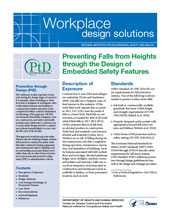Preventing Falls from Heights through the Design of Embedded Safety Features
May 2014
DHHS (NIOSH) Publication Number 2014-124

Construction is one of the most dangerous industries [Toole and Gambatese 2008], and falls are a frequent cause of fatal injuries in this industry. Of the 4,693 fatal work injuries that occurred in 2011, 553 (12%) were the result of falls to a lower level. Fatal falls in construction accounted for 46% of all work-related fatal falls in 2011 [BLS 2012]. OSHA estimates that each fall from an elevated position in construction (both fatal and nonfatal) costs between $50,000 and $106,000 [OSHA 2012]. Workers are at risk of falling during initial construction, and after completion during operation, maintenance, renovation, and demolition of buildings. Facility features associated with falls include floor and roof edges, elevated platforms, ledges, atria, skylights, machine rooms, and ladders and stairways. Falls can occur from temporary structures used in construction and maintenance such as scaffolds or ladders, or from permanent locations such as roofs.
Preventing Falls from Heights through the Design of Embedded Safety Features [PDF - 397 KB]
- Page last reviewed: June 6, 2014
- Page last updated: June 6, 2014
- Content source:
- National Institute for Occupational Safety and Health Education and Information Division


 ShareCompartir
ShareCompartir